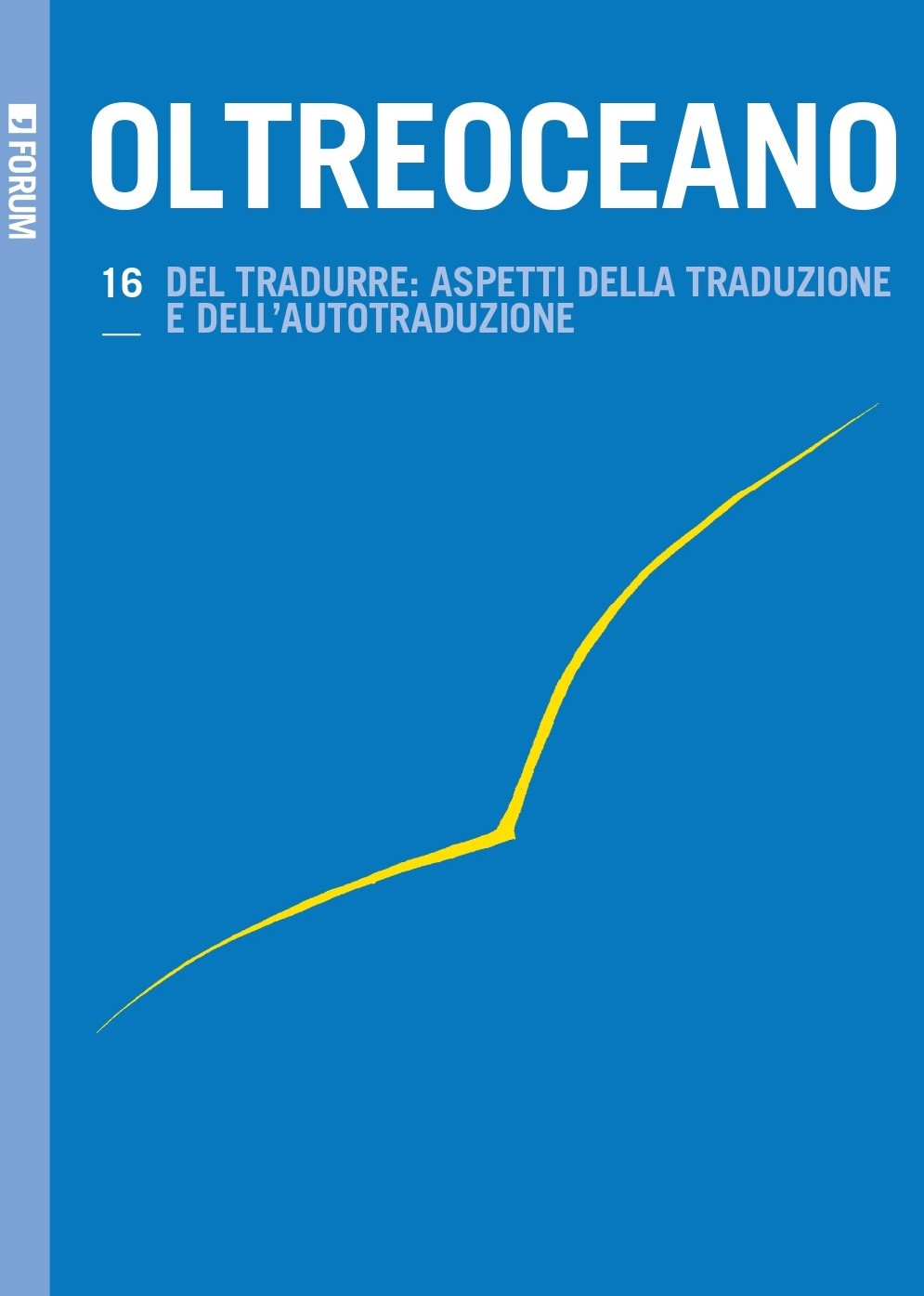Self-Translation in Nabokov’s Fiction: Three Paradigmatic Cases
Keywords:
self-translation, Nabokov, novel, short story autobiography, autobiographyAbstract
The article examines Nabokov’s theory and practice of self-translation in three paradigmatic cases: the novel Laughter in the Dark, the short story “Vozvraschenie Chorba”, and the autobiography Speak, Memory, self-translated into Russian as Drugie berega (1954), re-written in English in a revised and extended edition in 1966, and somehow completed in a fictional text titled Look at the Harlequins! (1974).
L’auto-traduzione nella narrativa di Nabokov: tre casi esemplari
L’articolo esamina la teoria e la pratica dell’autotraduzione di Nabokov in tre casi esemplari: il romanzo Laughter in the Dark, il racconto “Vozvraschenie Chorba” e l’autobiografia Speak, Memory, autotradotta in russo come Drugie berega, riscritta in inglese in una versione
rivista e ampliata nel 1966, in modo romanzato nel testo Look at the Harlequins! (1974).
Downloads
References
Babaian, C. (2018): Time Travel and the Naturalist’s Notebook: Vladimir Nabokov Meets the TimeTree of Life. The American Biology Teacher, 80 (9), pp. 650-658.
Boyd, B. (1990): Vladimir Nabokov. The Russian Years. Princeton: Princeton University Press.
Boyd, B. (1991): Vladimir Nabokov. The American Years. Princeton: Princeton University Press.
Boyd, B. (2011): Stalking Nabokov. Selected Essays. New York: Columbia University Press.
Chomsky, N. (2017): Tre lezioni sull’uomo. Linguaggio, conoscenza, bene comune. Transl. by M. Manganelli. Milano: Adriano Salani.
Cooper, S. (2018): Translating Timelessness: The Relationship between Vladimir Nabokov’s Conclusive Evidence, Drugie berega, and Speak, Memory: An Autobiography Revisited. The Modern Language Review, 113, 1, pp. 39-56.
Dobbin, B. (2011): The Queer Part Doors Play’ in Nabokov’s Laughter in the Dark. In S. Mukherji (Ed.), Thinking on Thresholds. The Poetics of Transitive Spaces (pp. 29-42). London, New York, Melbourne, Delhi: Anthem Press.
García de la Puente, I. (2015): Bilingual Nabokov: Memories and Memoirs in Self-Translation. Slavic and East European Journal, 59, 4, pp. 585-608.
Hetényi, Z. (2018): Translating Self-Translation and the Units of the Translation: the Case of Nabokov. Studia Slavica Academiae Scientiarum Hungaricae, 63, 1, pp. 49-55.
Jakobson, R. (1959): On Linguistic Aspects of Translation. In R. A. Brower (Ed.), On Translation (pp. 232-239). Cambridge: Harvard University Press.
Marrone, G. (2018): Prima lezione di semiotica. Bari-Roma: Laterza.
Mayer, R. (2002): Nabokov: a Case Study in the Art of Translation. Fathom. The Source for Online
Learning. Retrieved from file:///C:/Users/42lui/Downloads/Nabokov_A_Case_Study_in_the_Art-of_Trans.pdf
Nabokov, V. V. (1951): Conclusive Evidence. A Memoir. New York: Harper & Brothers.
Nabokov, V. V. (1966): Speak, Memory. An Autobiography Revisited. New York: Capricorn Books.
Nabokov, V. V. (1990): Eugene Onegin. A Novel in Verse by Aleksandr Pushkin I. Princeton: Princeton University Press.
Nabokov, V. V. (2001): Laughter in the Dark. London: Penguin Books.
Nabokov, V. V. & Wilson, E. (2001): The Nabokov-Wilson Letters, 1940-1971. S. Karlinsky (Ed.). Berkeley and Los Angeles: University of California Press.
Nabokov, V. V. (2002): The Stories of Vladimir Nabokov. D. Nabokov (Ed.). New York: Vintage International.
Nabokov, V. V. (2011): Drugie berega G. Barabtarlo & V. Pazhidaev (Eds.). Sankt-Peterburg: Azbuka.
Nabokov, V. V. (2014): Kamera obskura. V. Pazhidaev & V. Gorelikov (Eds.). Sankt-Peterburg: Azbuka.
Nabokov, V. V. (2016): Letters to Vera. O. Voronina & B. Boyd (Eds.). London: Penguin Classics.
Nabokov, V. Vozvraschenie Chorba (1930, sbornik rasskazov). Retrieved from http://flibusta.site/b/158137/read
Naiman, E. (2014): When Nabokov Writes Badly: Aesthetics and Morality in Laughter in the Dark. The Russian Review, 73, pp. 550-570.
Newmark, P. (1981): Approaches to Translation. Oxford: Pergamon Press.
Ponomareff, C.V. (2013): The Metaphor of Loss in Vladimir Nabokov’s Speak, Memory. Queen’s Quarterly, 102, pp. 402-413.
Rampton, D. (2016): The Aesthetics of Moral Contradiction in Some Early Nabokov Novels. In M. Rodgers & S. E. Sweeney (Eds.), Nabokov and the Question of Morality. Aesthetics, Metaphysics, and the Ethics of Fiction (pp. 109-125). London: Palgrave Macmillan.
Roper, R. (2015): Nabokov in America. On the Road to Lolita. New York and London: Bloomsbury.
Russo, M. (2015): Hypotranslating and Hypertranslating Theories in Nabokov’s Anja v strane chudes (1923) and Eugene Onegin (1975). Cosmo, 7, pp. 91-102.
Steiner, G. (2004): Dopo Babele: aspetti del linguaggio e della traduzione. Transl. by R. Bianchi & C. Béguin. Milano: Garzanti.
Struve, G. (1932): Vladimir Sirin. The Return of Tchorb. This Quarter, 4, 4, pp. 592-602.
Trousdale, R. (2011): Nabokov and the Transnational Canon. The Nabokovian, 66, pp. 7-14.
Downloads
Published
How to Cite
Issue
Section
License
Copyright (c) 2020 Oltreoceano - Rivista sulle migrazioni

This work is licensed under a Creative Commons Attribution-NonCommercial-ShareAlike 4.0 International License.
The authors undertake to comply with the following conditions, which are considered accepted at the time of submission of their contributions.
The sending of a text implies that it is unpublished and not submitted to be published elsewhere.
1. If accepted, the author shall confer on the publisher the right to publish and distribute it both in paper form and in the online electronic edition. The published articles will be downloadable and made available in open access.
2. Provided that it correctly indicates that the first publication took place in the journal Oltreoceano. Rivista sulle migrazioni the author has the right to: a) reproduce the article in separate extracts or collected in a volume; b) publish the article on their personal website or teaching site provided that these sites are of a non-commercial nature; c) deposit the article in online archives of a non-commercial nature, linked to the institution they belong to or as part of projects for the non-commercial dissemination and open access of scientific works.
The use of contributions by third parties, for commercial or otherwise unauthorized purposes, is not allowed. The publisher declines all responsibility for the unauthorized use of the material published in the journal.












